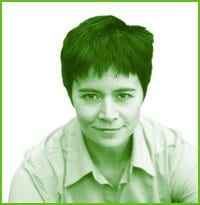Doing a storyon Ann-Marie MacDonald is a dream and a nightmare.
A dream because, well, she’s Ann-Marie MacDonald. Funny, warm, charming and enormously successful. As an actor, she’s performed in films (I’ve Heard The Mermaids Singing; Better Than Chocolate) and theatre (The Attic, the Pearls and the Three Fine Girls, which she co-wrote with her partner, award-winning director and writer Alisa Palmer). She’s written award-winning theatre productions (the play Goodnight Desdemona, Good Morning Juliet; and Anything That Moves, a musical she co-wrote with Allen Cole and Palmer).
And then there’s that little first novel of hers, Fall On Your Knees, a 1996 CanLit sensation, global bestseller and one of Oprah Winfrey’s picks for her famous book club. MacDonald’s second novel, The Way the Crow Flies, published last September, was one of the most anticipated books in Canadian publishing history.
Doing a story on MacDonald is a nightmare, too, for all of the above reasons. She is mind-bogglingly intelligent-conversant in opera, international politics, Cold War history, Cape Breton culture, feminism, musical theatre, human rights and, now that she and Palmer are proud mothers, philosophies of parenting.
Interviewing MacDonald means wondering whether arriving with the latest Joan Didion tucked under your arm will make you look smarter and hoping against hope that MacDonald won’t insist upon conducting the interview in Latin.
Which is why it is so disarming when MacDonald begins the interview by confessing the depths of her own self-doubt.
“The negative voice inside my head was much stronger with the second novel than the first, maybe because I was using material that was much closer to me,” she says.
“I tapped into all these old reservoirs of self-loathing, the murk and bile of my own psyche. I was extremely hard on myself. Almost every day I sat down to write, there was this voice in my head saying, ‘What makes you think that anyone is interested in what you have to say?’ I would write something and think it was just awful.
“But that kind of egotism-and self-loathing is egotistical-has no place in art. I had to find the guts and the generosity to fight that and write. Facing that page is like entering a dragon’s lair. You have to figure out how to tame the beast.”
It was more than just the typical writer’s sophomore anxiety, though MacDonald said it took some work to free her from the gravitational pull of what she calls “Planet Fall On Your Knees.” MacDonald says that one struggle was “being in a position where I didn’t have to write. Throughout my 20s and most of my 30s, I was living hand-to-mouth. I wrote to make money. I wrote to prove something to myself and to other people. I was working on adrenaline.
“After the good fortune that came out of Fall On Your Knees, I was a little paralyzed. I was happily in a new relationship. I didn’t have to worry about money or making a name for myself. I had gotten so used to thriving in a war zone as an artist, that it was hard to write in peacetime. I had to turn my swords into ploughshares and write with a different motivation.”
***
Without the external strife of a hardscrabble writer’s life, MacDonald set herself what was perhaps an even more daunting challenge: mining her own history. She drew upon her background as a Royal Canadian Air Force kid for many of the details of The Way the Crow Flies, the first two-thirds of which are set on an RCAF station near London, Ontario in the early 1960s. The impossibly happy McCarthy family has just been transferred from Germany back home to Canada, where husband Jack is in charge of a flight training school. Mimi, his beautiful Acadian wife, sets up home for their two children, eight-year-old Madeleine and her 11-year-old brother Mike.
On the surface, the family is living the post-war dream, during what MacDonald calls “that strange, brief, golden moment when social progress screeched to a halt.” Mimi is in the kitchen, Jack is at work, dinner is on the table by six. There is curling on the weekend and backyard barbecues and covered casserole dishes for neighbours in need. MacDonald’s meticulous attention to detail vividly brings the era to life: from the food the McCarthys eat and the clothes they wear to the television shows they watch.
Of course, since the novel springs from MacDonald’s dark imagination, what’s under the surface is much more complicated. “At the time, television shows like Leave It To Beaver were presenting the world as this innocent, peaceful place,” she says. “But it was also the first time in history that the mere press of a button could put an end to the world.”
As the tensions of the Cold War and the space race heat up, fault lines begin to appear in the McCarthy family. Believing he is acting for the good of world security, Jack naïvely becomes involved in a corrupt, covert operation with shattering, unforeseeable consequences. Meanwhile, Madeleine is keeping a horrible secret of her own, about the terrible “exercises” her teacher forces girls to perform after school. These two plots-one a global, the other a local atrocity-collide when one of Madeleine’s classmates is sexually assaulted and murdered. The ensuing investigation forces both Madeleine and Jack to make a painful moral choice about whether to reveal their secrets.
The last third of the novel takes place more than 20 years later, when a now adult and openly lesbian Madeleine is a popular comedian on the brink of big-time stardom. Her pleasure in her success is marred by her inability to escape the past. To free herself, she delves into her childhood to discover what really happened to her classmate.
The Way the Crow Flies is a rich, layered, riveting story, written with an urgency and sense of moral outrage that never becomes preachy or heavy-handed. Told mainly through Madeleine’s perspective, the book presents the complex era MacDonald recreates so magnificently through a child’s eyes. “I suppose there is a sense of using a child’s voice in the same way a comedian’s voice is used,” MacDonald says, “to offer a fresh way of looking at the world.” Madeleine has more imagination and is freer from prejudice than the grown-ups around her, but her misinterpretation of events and their motivations lead to tragic results.
As in Fall On Your Knees, the vulnerability of children is explored-heartbreakingly so-through sexual abuse. Citing the recent revelations of sexual abuse by Catholic priests in parishes and orphanages, MacDonald says the issue has finally “come out of the closet with a deafening roar.
“One of the reasons I’m haunted by the issue of sexual abuse of children is because it’s so prevalent. And we’re finally at a point when these secrets and these mass stories of abuse are being revealed.
“As a writer, I’m drawn to these stories because they contain everything: theft, loss, restitution and healing. After everything has been taken from you, where do you go? How do you move forward? For these characters, I think the healing comes in telling the story, in surviving and being able to say, ‘I made it.’ They may have lost everything, but perhaps in the end, they ended up with more.”
* Ann-Marie MacDonald will read Wed Sep 22 at 7 pm at the Canadian Memorial Church, 1806 W 15th Ave (at Burrard St). Tickets $10. Call Women in Print at 604.732.4128 for more information.
The Way the Crow Flies, published by Harper Collins, is available in most bookstores.
ANN-MARIE MACDONALD.
Reading Sep 22, 7 pm.
Canadian Memorial Church.
1806 W 15th Ave.
Info: 604.732.4128.


 Why you can trust Xtra
Why you can trust Xtra


